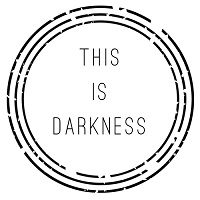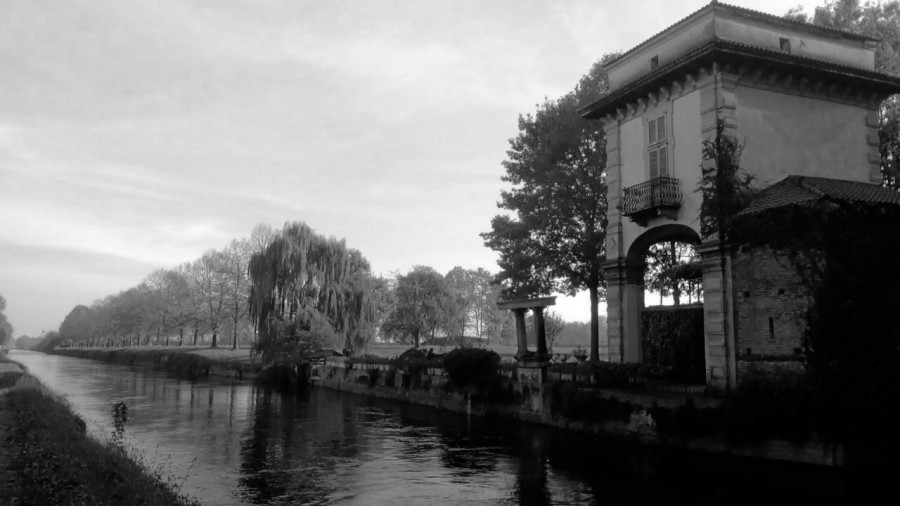
Matteo Brusa is the man behind the dungeon synth project, Medhelan, and the dark ambient project, La Tredicesima Luna. Hailing from northern Italy, Brusa’s cultural and geographical histories have played a big part in his identity as a musician. I was able to pick Brusa’s mind for this quite extensive interview, which will look into the background of the man, as well as the beginning and future of his musical projects.
Michael: What sort of music inspired you to become a musician?
Matteo: I’ve been exposed to several music genres since a very young age, but if I have to name those which most inspired me to become a musician, I’d say classic rock, progressive rock and electronica. I discovered Black Sabbath at age 12 or 13, while Italian 1970s progressive rock is the reason why I picked up bass at age 14. At almost the same time I discovered electronic music from the 90s, especially European trance, minimal techno, downtempo and breakbeat, and developed an interest in electronic music production.
Michael: When you realized you wanted to start making music, how did things evolve leading up to Medhelan and La Tredicesima Luna?
Matteo: As mentioned before, I grew up in a very music-friendly environment. My father was an amateur keyboards player and used to own several different instruments, among which a prized Roland Juno-106 which is now in my care. As a kid I spent a lot of time toying with them and eventually teaching myself how to play a bit of keyboards and some guitar;at age 14 I began studying music theory 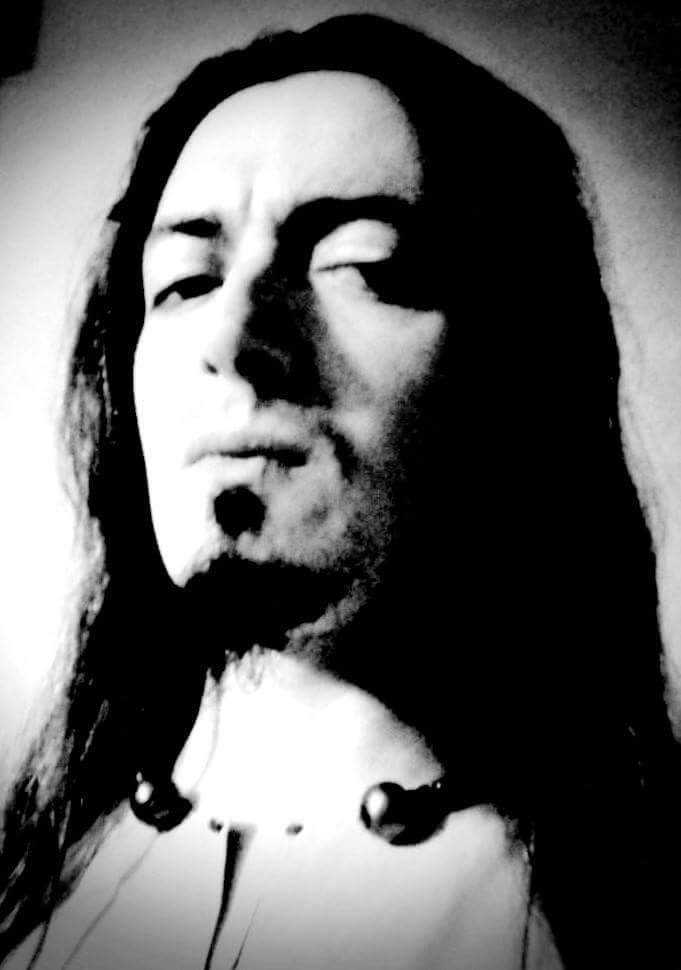 and bass guitar, and started producing my first raw electronic tracks on a simple tracker software. Since then I’ve tried my hand at several electronic music styles, I’ve played bass in a number of underground bands through the years, and I created my first full-fledged musical project KRiOS, active from 2006 to 2014, which started out as a industrial dark ambient/noise act and eventually grew to encompass all my musical influences, including folk, shoegazing, dreampop and electronica. The major turning point was when I came in contact with extreme metal in my teens: I was particularly impressed by Black Metal, its counter-cultural significance, Weltanschauung and aesthetics, and how these same characteristics were applied to electronic music by the likes of Burzum, Ildjarn, Neptune Towers, Mortiis and Wongraven. Black Metal derived Dungeon Synth and Dark ambient became my genres of choice, those which most resonated with my self, when I felt the urge to create something carrying a deeper, more personal meaning. At that point it wasn’t “just music” to me anymore.
and bass guitar, and started producing my first raw electronic tracks on a simple tracker software. Since then I’ve tried my hand at several electronic music styles, I’ve played bass in a number of underground bands through the years, and I created my first full-fledged musical project KRiOS, active from 2006 to 2014, which started out as a industrial dark ambient/noise act and eventually grew to encompass all my musical influences, including folk, shoegazing, dreampop and electronica. The major turning point was when I came in contact with extreme metal in my teens: I was particularly impressed by Black Metal, its counter-cultural significance, Weltanschauung and aesthetics, and how these same characteristics were applied to electronic music by the likes of Burzum, Ildjarn, Neptune Towers, Mortiis and Wongraven. Black Metal derived Dungeon Synth and Dark ambient became my genres of choice, those which most resonated with my self, when I felt the urge to create something carrying a deeper, more personal meaning. At that point it wasn’t “just music” to me anymore.
Michael: Outside of music, are there any other things for which you are passionate?
Matteo: I have a solid interest in European history and culture, both ancient and modern, and in metapolitics: I’m intrigued by everything that puts our social, economic and values system, deemed untouchable by most, into question. I highly value doubt and critical thought over given truths and conformity. Moreover, I support any cause that aims at preserving differences and natural diversity over homologation, and as a consequence I’m very passionate about the preservation of rural traditions, folk lore, legends, tales and the gallo-italic native Lombard language of my homeland in northern Italy, all things endangered by the slow destruction of traditional communities and cultural identities.
Michael: How has the history of your particular region affected your way of looking at life?
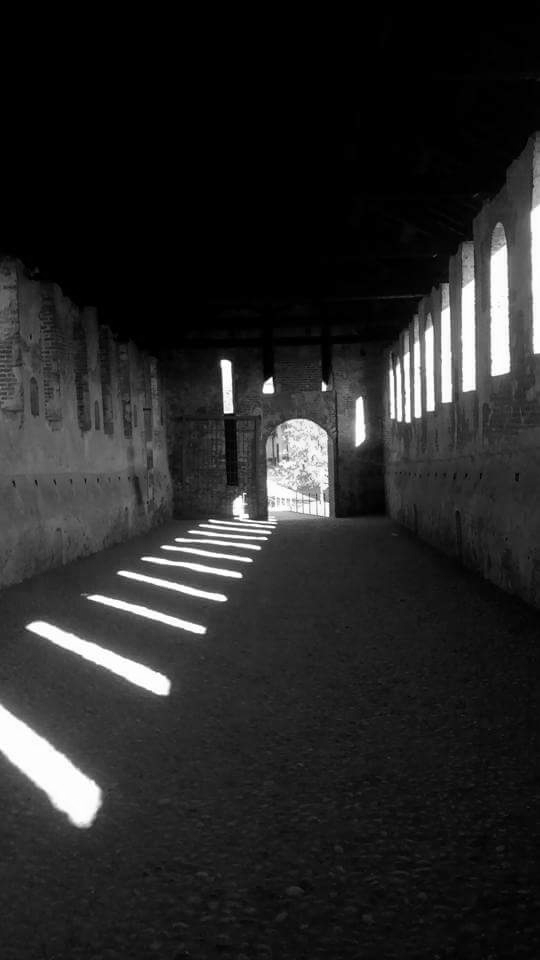
Vigevano Castle
Matteo: I grew up on the border between Lombardy and Piedmont, and I have half Lombard, half Piedmontese ancestry. It’s a place rich of historical traces spanning from the proto-Celtic cultures of Golasecca and Canegrate to World War II. A land dotted with feudal age castles and keeps, still functioning abbeys and monastaries, medieval villages perfectly preserved in their core structure, churches, monuments and works of art from all over the centuries and so on, up to the modern age. The place where I was born and where I lived for 25 years, Vigevano, is brimming with history. It was part of the Second Lombard League in the 13th century. It holds a complex castle system, complete with an innovative elevated passageway, built between the 13th and 15th centuries by the powerful Visconti and Sforza feudal families, which includes one of the finest plazas in Italy. At the time, Leonardo da Vinci worked in Vigevano for Ludovico Sforza, Duke of Milan. It’s also the place where, during the First War of Italian independence, the Salasco armistice between Austria and Piedmont was signed in 1848 and where in 1849 the battle of Sforzesca was fought. In the industrial age, it flourished with the most renowned shoemaking industry in Italy and it’s still a tradition. Eleonora Duse, renowned actress and lover of Gabriele D’Annunzio, was born there in 1858. When you grow up surrounded by history like this, you can’t just ignore who you are and where you come from, which people and events influenced your ancestors, and how it cascaded to you. This is the lesson I learned from the history of my region. My roots are firmly and deeply radicated in this place, and I’m proud to collect its heritage. Sadly, the majority of people just seem not to care anymore.
Michael: When did you first take an interest in the history of your region?
Matteo: I could say it’s always been there, as I remember being a kid in primary school and listening in awe to the teacher recounting the history of my hometown, as I mentioned before, from Celts to Roman age, to Lombards’ and Franks’ rule and then to the Visconti and Sforza families in feudal age, and again from Spanish and Austrian domination to the Savoy royal family’s reign, straight into Napoleonic era and then through the First War of Italian independence towards modern age. But if I had to pick the moment when it actually became a conscious, fully developed interest, that would be in my late teens/early twenties, some time before I set on composing what would eventually become the bulk of Medhelan’s “Ticinum Insubria” album, a time when I started feeling the need to embrace my cultural roots rather than downplay them.
Michael: You have released several albums now in the cassette format. Why do you think this renaissance in cassette releases has happened and what is the most important aspect of them to your music.Matteo: As far as I can tell, the renaissance of compact cassette is mainly due to the “nostalgia factor”, to put it this way, harking back to things instantly reminding of a “golden age” of sort. While this could have been enough of a reason for reviving them in the general context of underground music and its current retro trends, I believe the return of compact cassettes holds a deeper significance to our scene: it is a powerful statement of independence from the mainstream, against the rise of dematerialized digital music, in favor of an iconic, old school, analog physical alternative. Philosophical issues aside, tape gives a recognizable sonic quality to music, a depth and warmth which is a very welcomed enhancement to certain styles of music, such as ambient.
To sum it up, I like cassettes both for how they sound and look and because of their cultural significance.
Michael: You’ve released albums now through Deivlforst Records, Lighten Up Sounds and Haftvad Records. Were these all good experiences with these labels? Will you continue working with some of them for future releases?
Matteo: I’ve had great experiences with all of them. I first got in touch with Deivlforst through Grimrik, who eventually became a friend and mentor to me, and deserves all the credit for tutoring me on taking Medhelan to “Fall of the Horned Serpent” level. I feel close to both his and Murgrind’s vision and philosophy about music and the scene, and consider Deivlforst as Medhelan’s natural home;Medhelan’s next album will be released by Deivlforst. Matt Himes of Lighten Up Sounds is a great and extremely hard-working guy, who took La Tredicesima Luna under his wing to provide it with the best presentation, promotion and distribution available. I have only positive things to say about my experience with him, La Tredicesima Luna is likely staying with Lighten Up Sounds. Finally, Haftvad was Medhelan’s first label, and a very good collaboration, despite inexperience and some difficulties not depending on either me or the label. We never did anything again together, but I was impressed by Ramin’s dedication to the Dungeon Synth scene and community.
Michael: You’ve also had several self-released physical editions, including the beautifully crafted Ticinum Insubria re-release on cassette. Do you prefer leaving these physical releases to labels or was it equally enjoyable to create the releases yourself?
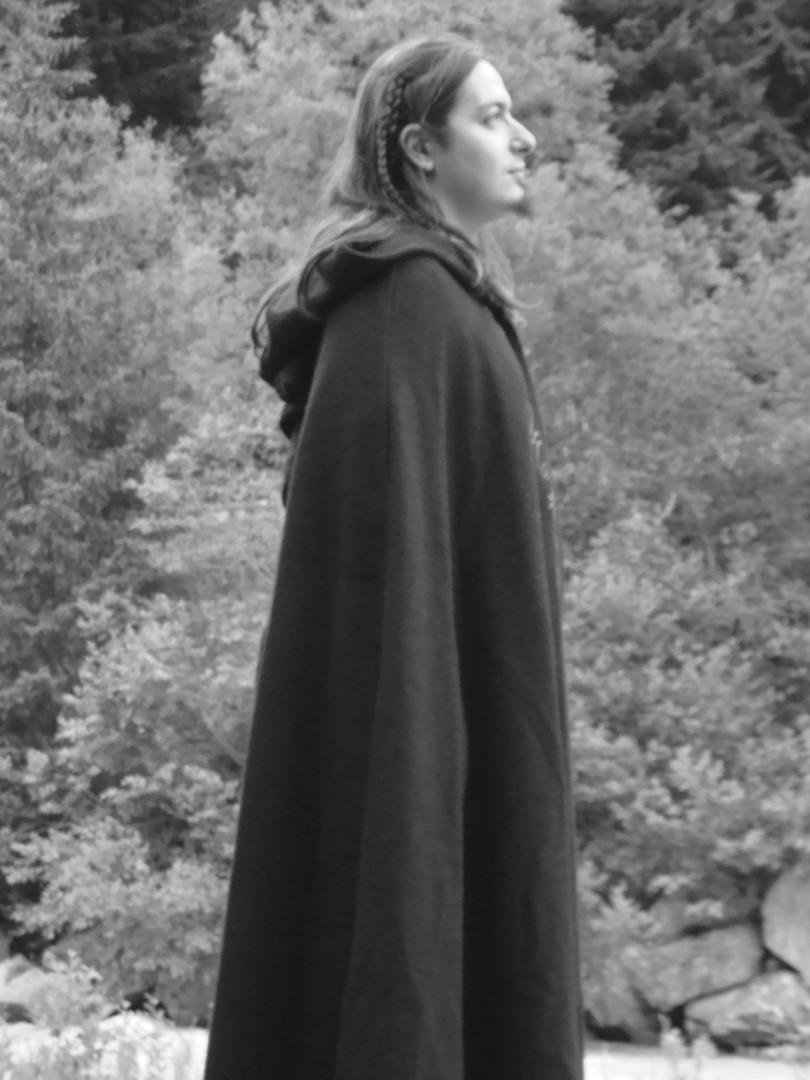 Matteo: While I enjoy self-releasing and being in full control when creating the entire opus from scratch, producing and distributing it, working with a label has a number of advantages that significantly reduce workload and costs, while usually making for a more professional final result. “Ticinum Insubria” itself was kind of a hybrid, as Dan Capp did the whole design and layout work while I only took care of production and distribution. I’ll probably keep releasing both ways, but if I had to choose one, today I lean more on having a good label take care of the process.
Matteo: While I enjoy self-releasing and being in full control when creating the entire opus from scratch, producing and distributing it, working with a label has a number of advantages that significantly reduce workload and costs, while usually making for a more professional final result. “Ticinum Insubria” itself was kind of a hybrid, as Dan Capp did the whole design and layout work while I only took care of production and distribution. I’ll probably keep releasing both ways, but if I had to choose one, today I lean more on having a good label take care of the process.
Michael: Does religion play any major role in your life and/or music?
Matteo: Rather than religion I’d say spirituality plays a major role in my life: I follow a Celtic Pagan reconstructionist path which permeates my life and gives perspective to my music. I try to live my daily life as an all-encompassing ritual, living in the world and embracing its beauty and chaos without ever straying too far away from things that really matter, always caring for those who walked here before me, those who walk by my side and those who’ll walk my steps after I’m gone.
Michael: I know this question has already been answered in a previous interview for Masmorra’s physical dungeon-synth zine, but for those that haven’t had the pleasure to browse that edition, what does Medhelan mean, and why did you decide on this name?
Matteo: Medhelan is the ancient Celtic name of the town Romans called Mediolanum, which is present-day Milan. According to Roman historian Livy, it was founded around 600 BC by the Gaulish chieftain Bellovesus, nephew of the legendary king Ambigatos, who gathered people from several different Celtic tribes to establish a settlement in northern Italy; this particular endeavor, while based on obvious tangible needs, is also loaded with spiritual significance if interpreted as a “coming of age” quest. I picked Medhelan as my project’s name because it perfectly relates to both my love for my homeland with its rich history and my Celtic spiritual path, while at the same time it speaks of the reward coming after the struggle, and of a ritual rebirth.
Matteo: All Medhelan albums were created on software synthesizers and sample libraries only. “Fall of the Horned Serpent” is entirely recorded on Propellerhead Reason 3.5 factory soundbanks! Grimrik was able to squeeze gold out of twelve years old entry level libraries, which seems an amazing feat to me. I like to expand my sonic palette and avoid repeating myself though, so future releases will likely include some hardware synths and possibly some real instruments.

Ticino River
Michael: Some of your tracks use field recordings, I wonder if you’ve had any interesting experiences while on field recording expeditions?
Matteo: This might come as a surprise, but I actually almost never employ field recordings!The wide atmospheres swelling and rumbling underneath my songs are mostly generative soundscapes, synth drones playing dissonant chords, or stuff I create myself by heavily manipulating bits of sampled sounds, different pieces of music and such. For example, one track from “Ticinum Insubria” (I won’t reveal which one!) stands atop a completely unrecognizable sample of an alpine choir song. I like to experiment with such techniques.
Michael: Are there any new releases in the works for Medhelan? Has a label been decided for the release, which could be announced publicly?
Matteo: As previously mentioned, a new Medhelan album is in the works, albeit very slowly. It will be quite different from the previous one, and again it will be released by Deivlforst Records.
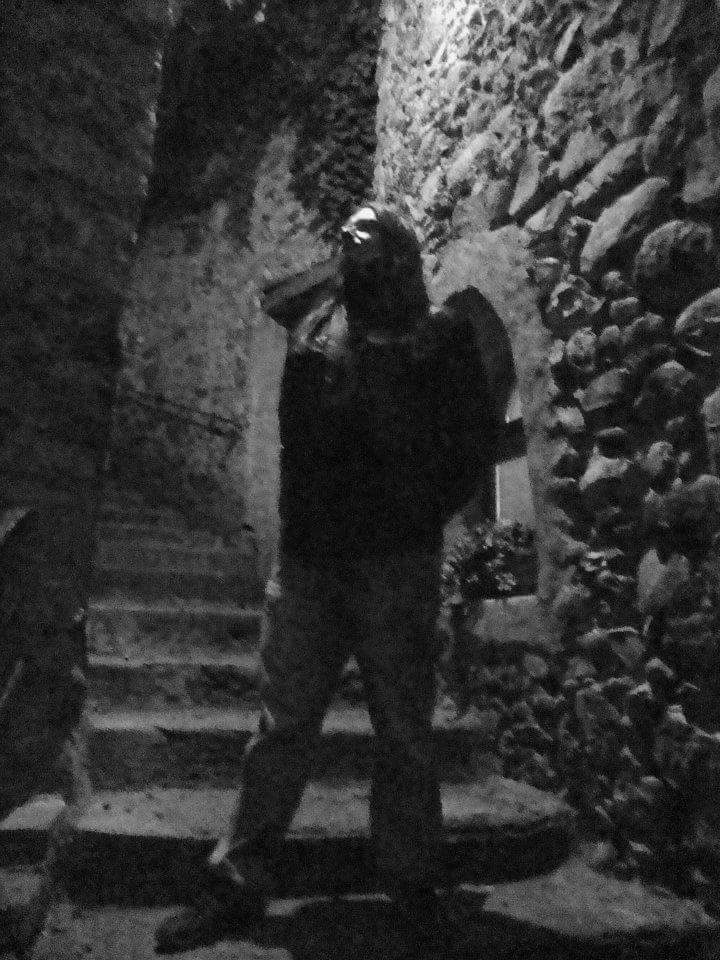 Michael: Medhelan is obviously a very fantasy oriented project, especially on Fall of the Horned Serpent. What were some of your favorite fantasy stories/mythos/sagas? Do any of them play into the works of Medhelan, or are you working within a framework totally of your own making?
Michael: Medhelan is obviously a very fantasy oriented project, especially on Fall of the Horned Serpent. What were some of your favorite fantasy stories/mythos/sagas? Do any of them play into the works of Medhelan, or are you working within a framework totally of your own making?
Matteo: To be honest, while “Fall of the Horned Serpent” and “The minstrel’s fireplace tales” are fantasy-oriented in appearance, I’ve never considered the fantasy element to hold such a primary importance in Medhelan; for example, the story in Serpent unfolds in the form of an episodic fantasy tale, ridden with echoes of northern sagas (anyone familiar enough with the subject matter will find clear connections), but it merely serves as an allegorical means to express my views and vision of life and the world, to speak out about things I care for. While I like fantasy settings, I’m not much of a fantasy reader, besides my love for Tolkien’s whole opus, but I’m very much into epic poems and literature: my must-reads include Homer’s Iliad (Hector is a figure I strongly admire and relate to, his human virtue and flaws make his tragedy the most poignant in the whole story) and the Odyssey, the Arthurian cycle, Beowulf, von Eschenbach’s Parzival, the Chanson de Roland and more.
Michael: La Tredicesima Luna translates at The Thirteenth Moon. What is the significance of this name?
Matteo: The thirteenth moon of the year, sometimes called blue moon, is the second full moon occurring in a single month, like a “bonus” moon round. It’s an event occurring only once in a few years (hence the expression “once in a blue moon”) and it’s held by certain traditions as a time favoring divination and magick. I picked the name because of the latter implications and how they relate to La Tredicesima Luna’s concept.
Michael: How long have you had the idea to release an album as La Tredicesima Luna?
Matteo: The idea for La Tredicesima Luna first came to me in 2012. It was initially supposed to be a Pagan neofolk project with dark ambient leanings. I recorded a few demos back then, which were subsequently discarded. When I decided to split Medhelan’s ambient side from its new Dungeon Synth path, it was a natural choice to revive La Tredicesima Luna from standby.
Michael: Do both projects follow similar themes, or is there a vast difference in the thematic core of each project?
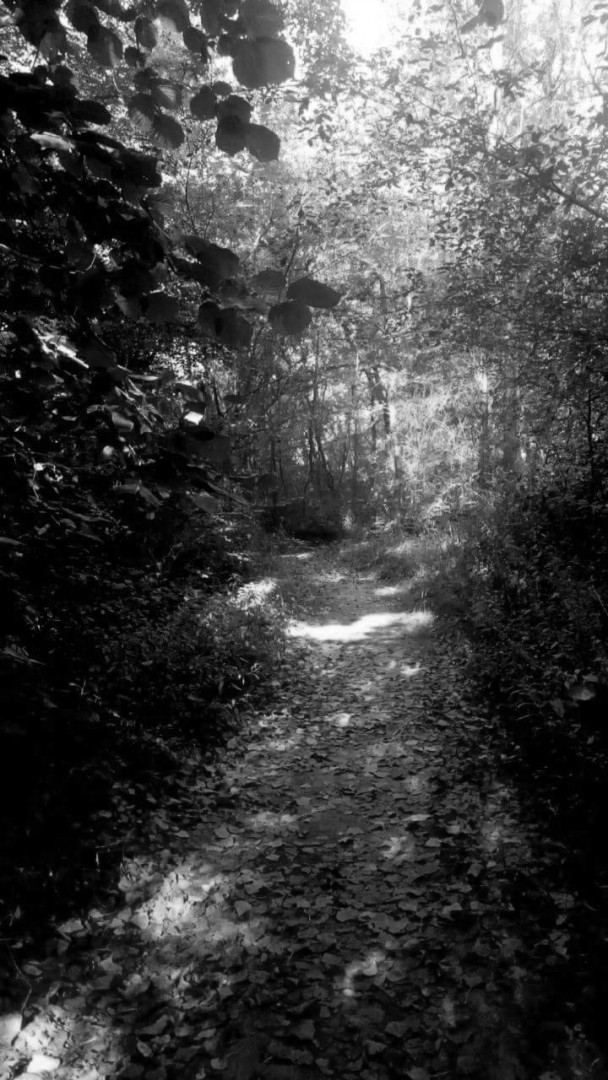
Ticino Woods
Matteo: While both take a Pagan stance in concept, Medhelan is mainly based on history, Celtic culture and spirituality handled in different ways, ranging from the simple historical soundscaping of Ticinum Insubria to the full-fledged allegorical storytelling of Serpent, while La Tredicesima Luna holds a more abstract, ritual approach focused on Pagan symbolism, mysticism and contemplation.
Michael: What is next for La Tredicesima Luna? Are you working on a follow-up to Il Sentiero Degli Dei or giving the project a momentary rest?
Matteo: The follow-up to “Il sentiero degli Dei” is currently release-ready and will likely see the light some time next year through Lighten Up Sounds.
Michael: What do you think the long-term future will hold for you musically? Will Medhelan and/or La Tredicesima Luna continue to be your main focus or do you have other ideas which you would like to explore?
Matteo: Medhelan and La Tredicesima Luna will likely remain my primary focus; that said, I enjoy making different styles of music and I constantly find new musical interests, so I wouldn’t exclude anything.
Michael: Thank you so much for your time Matteo, are there any final words you would like to say to readers or anything I missed, which you would like them to know?
Matteo: Thank you Michael for this in-depth interview. I’d like to say a huge thank you to all fans, friends and fellow musicians I could get in touch with over these years, to all people who contributed their work, dedication and criticism for making Medhelan and La Tredicesima Luna shine, and to the Dungeon Synth community as a whole, for constantly caring and supporting. I’m deeply satisfied and grateful for all that. Behold the strength of the community.
Medhelan Links: Facebook, Bandcamp
La Tredicesima Luna Links: Facebook, Bandcamp
